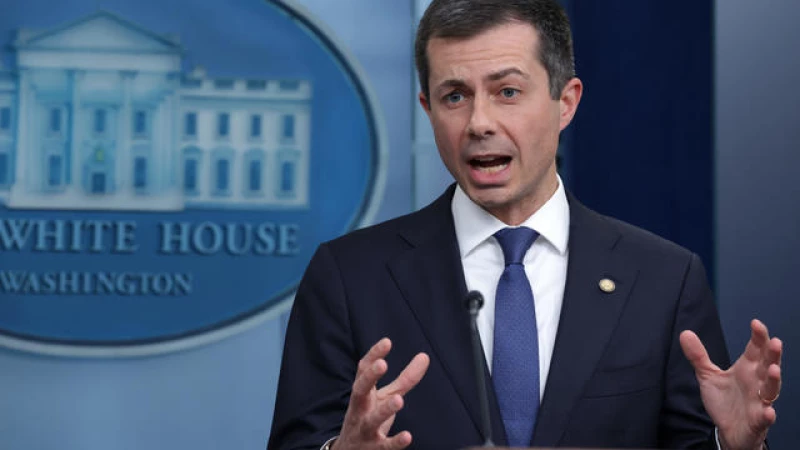New consumer protection rules will soon entitle airline passengers to automatic refunds when flights are canceled or significantly delayed, while also requiring airlines to reveal junk fees upfront.
In total, the new rules could save travelers $500 million annually, Department of Transportation Secretary Pete Buttigieg said Wednesday, describing the regulations as "the biggest expansion of passenger rights in the department's history."
The new rules take aim at some of the most common complaints against airlines, such as delays and difficulties getting refunds. Airlines will also have to disclose all possible fees, such as added costs for seat selection, when advertising a fare.
The regulations are likely to effect in October, officials said. Here's what to know about the new rules and what they mean for you.
You'll get an automatic refund for delayed or canceled flights
The first rule mandates that airlines must promptly refund customers when flights are meaningfully disrupted or delayed. Airlines will have to refund not only the amount of ticket prices, but government-imposed taxes and fees as well as airline-imposed fees.
Passenger Rights Expanded for Flight Refunds
Passengers are now entitled to automatic refunds for significantly delayed flights, thanks to a new rule announced by Transportation Secretary Buttigieg. This rule aims to simplify the refund process for travelers, especially those who may not be aware of their rights.
Previously, passengers had to navigate through chatbots or lengthy claims processes to receive refunds they were already entitled to. Airlines often offered vouchers or miles instead of cash refunds, which could be less than the original ticket cost. This new rule eliminates the need for passengers to accept alternative transportation or credits in lieu of refunds.
Qualifying for a Refund
Under the new rule, a flight delay of at least three hours for domestic flights and six hours for international flights will qualify passengers for automatic refunds. This standardization ensures that passengers are fairly compensated for significant flight disruptions.
Additional Refund Entitlements
In addition to delays, passengers will also be eligible for refunds in cases of other significant flight changes. This expanded coverage provides passengers with more protection and ensures that they receive proper compensation for any disruptions to their travel plans.
These changes encompass modifications to flights such as changes in departure or arrival airports, the addition of connections, or the downgrade of passengers to a different level of service. If a flight necessitates a passenger with a disability to make a connection at an airport or on a flight that is less accommodating, that also qualifies for a refund.
How long will it take to get a refund?
Airlines will have seven days to automatically refund passengers who purchased their tickets with a credit card, and 20 calendar days for other payment methods, the Transportation Department said.
"No more defaulting to vouchers or credits when consumers may not even realize they're entitled to cash," Buttigieg said.
Can I get a refund for delayed bags?
Yes, checked bag delays are also covered by the new rule.
When bags aren't delivered within 12 hours of a domestic flight's arrival at its gate, passengers will get a refund for their checked bag fee. On international flights, bags that don't arrive within 15 to 30 hours, depending on a flight's length, are covered by the rule.
What other refunds will be available?
The first rule also requires airlines to refund services that customers paid for but then didn't receive on the flight, such as wifi, seat selection, or in-flight entertainment, the Transportation Department said.
For instance, if passengers buy wifi access but it doesn't work properly, they are entitled to a refund for the service.
Surprise Fees: What's the Latest Development?
Recent transportation updates have introduced a new regulation aimed at curbing surprise or "junk" fees in the airline industry. These fees, which are often undisclosed to consumers until after purchase, are now required to be fully disclosed the first time airfare is advertised on an airline's website. The rule specifies that hyperlinks to fee information are not sufficient, emphasizing the need for transparent pricing from the outset.
This initiative seeks to combat the confusion caused by "drip pricing" tactics by ensuring that airlines reveal the total cost upfront, including charges for checked bags, carry-on bags, seat selection, and flight changes or cancellations. By providing this information early on, passengers can more accurately estimate the complete cost of their journey and make informed decisions.
Seating Assurance: What Does Buying a Ticket Guarantee?
Additionally, airlines are now obligated to clarify to customers that purchasing a ticket guarantees them a seat on the flight, irrespective of whether they opt to pay extra for seat selection.
Ensuring Transparency: How Can Passengers Identify Actual Flight Prices?
Another key aspect of the new rule prohibits airlines from advertising artificially low prices that do not include mandatory fees. This measure aims to eliminate deceptive "discount bait-and-switch" strategies that lure travelers with misleadingly low fares.
What are airlines saying about the new regulations?
According to Airlines for America, a trade group representing major U.S. carriers, complaints about refunds to the Transportation Department have significantly decreased since mid-2020.
A spokesperson from the group stated that airlines are providing various options, including fully refundable fares, to enhance the accessibility of air travel and assist customers in choosing tickets that align with their requirements.
The group reported that the 11 largest U.S. airlines have refunded a total of $43 billion to customers between 2020 and 2023.
Although Buttigieg mentioned that airlines are not particularly excited about adhering to stricter regulations, he believes that these new rules will enhance passenger trust in the companies and ultimately benefit the entire industry.
Buttigieg also expressed his hope that the new regulations will encourage carriers to enhance the overall consumer experience. For instance, if an airline is aware that it will automatically have to refund customers for canceled flights, it may focus more on precise scheduling, leading to a reduction in overall flight cancellations.







